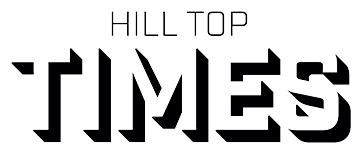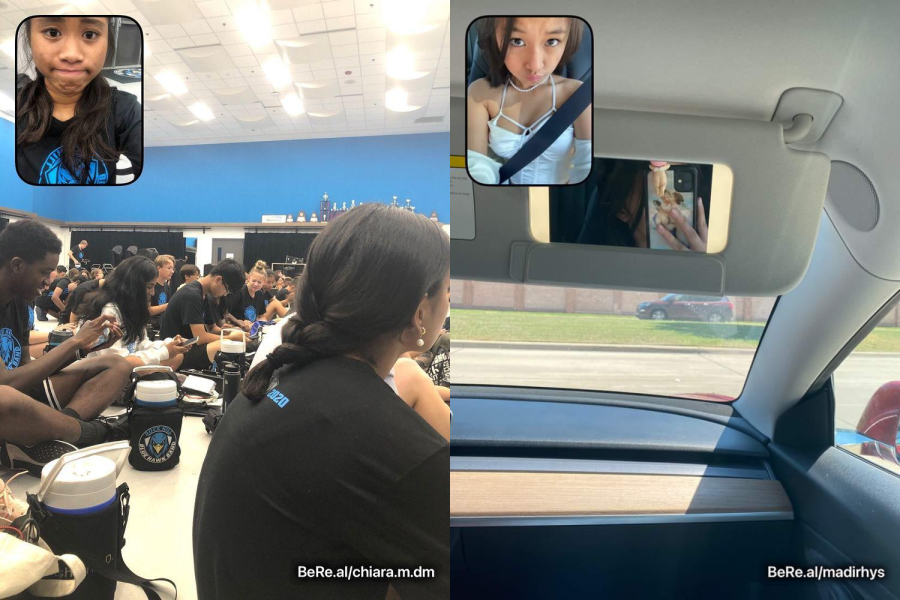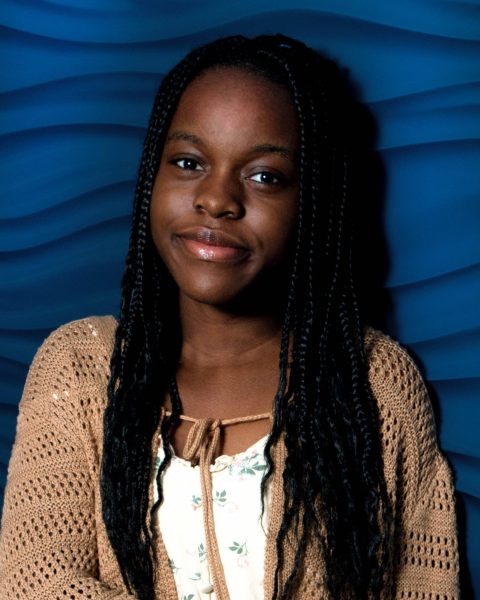BeReal is not all it claims to be, and that’s okay
Columnist discusses the trending app “BeReal”
A compilation of RHHS sophomores Chiara Damommio and Madison Martinez’s BeReal photos shows the function of the app. Dammomio takes a picture while at band practice, and Martinez takes one in her car.
September 15, 2022
Every month or so, a new social media app takes Gen Z by storm. This past month, it’s BeReal.
I’m sure we’ve all heard of the trending app that has been all the talk. BeReal claims that it’s not like other toxic and performative social media apps. The whole point of this new app is to push people to be their authentic selves on social media. But actually, BeReal is enforcing the harmful lifestyle standards that it claims to combat.
Here’s how the app works: everyone receives a notification simultaneously at a random time of the day. You then have two minutes to take a BeReal. Unlike any other photo, the app utilizes the front and back camera, that way your friends can see what you’re doing and your reaction at the moment. You can only see your friends’ BeReals once you’ve done yours.
BeReal is supposedly the opposite of performative social media – candid social media. Performative social media uses filters, makeup and strategic poses, intending to gain followers, love and simply romanticize one’s life. On the other hand, candid social media is supposed to be “in the moment.” In both candid and performative social media, you have to present yourself in a good way. However, in candid social media, you try to convince the viewers that it’s laidback and unposed.
That’s BeReal – candid. The goal is to catch you in the moment and show true authenticity. To show your friends that you’re living an average, mundane life. But is it really doing that?
In reality, BeReal upholds the toxic standards that increase our desires for an Instagrammable, enviable life. I’ve seen many fellow students ignore a BeReal notification and say something along the lines of, “I’ll just wait until I’m doing something actually fun.” Additionally, I’ve encountered many situations where someone eagerly calls me into their photo so they can look sociable. BeReal, like any other social media app, creates unrealistic lifestyle standards.
Notification by notification, we’re forced into toxic comparisons. When students see a friend that seems to be constantly in exciting moments, it can prompt them to question their own life. How come their life looks so fun? As someone who spends the majority of their free time in their room, I find myself thinking about these things. With the appeal of romanticizing life increasing, pressure is even higher. We’re constantly comparing ourselves to each other, considering who’s aesthetic and who isn’t.
On top of that, BeReal allows for “fake shaming,” or “authenticity policing.” The app exposes how many times you’ve retaken a picture. It also sends a notification if one of your friends sends their BeReal late. Consequently, users are silently (or not) shamed by their friends for not “being real.” But let’s dive deeper. Why aren’t they being real? Shouldn’t it be easy to reveal the mundane life that most of us share? It’s a simple answer — we, as people, are attracted to posts showing the fun things people are doing.
Similarly, fake shaming goes on on Instagram. Those who use beauty filters are shamed for being insecure and fake. As humans, we crave validation, and appealing posts give us that validation. So of course we wouldn’t want to “be real,” if that means appearing boring.
No, BeReal isn’t a bad app, it just didn’t fulfill its purpose, and it will never. Social media will never be completely authentic. The next time you get a BeReal, don’t worry about “being real” or otherwise. If you choose, wait until you’re in a lively moment, or conversely, take a picture of what you’re really doing the minute you get the notification. Social media does not define us.
Instead of shaming people for not being authentic, we should acknowledge that they’re simply working with the social media standards deeply rooted in society. By doing so, we can stop worrying about who’s being real and who’s not. We need to accept the fact that social media is performative, and that it always will be.








